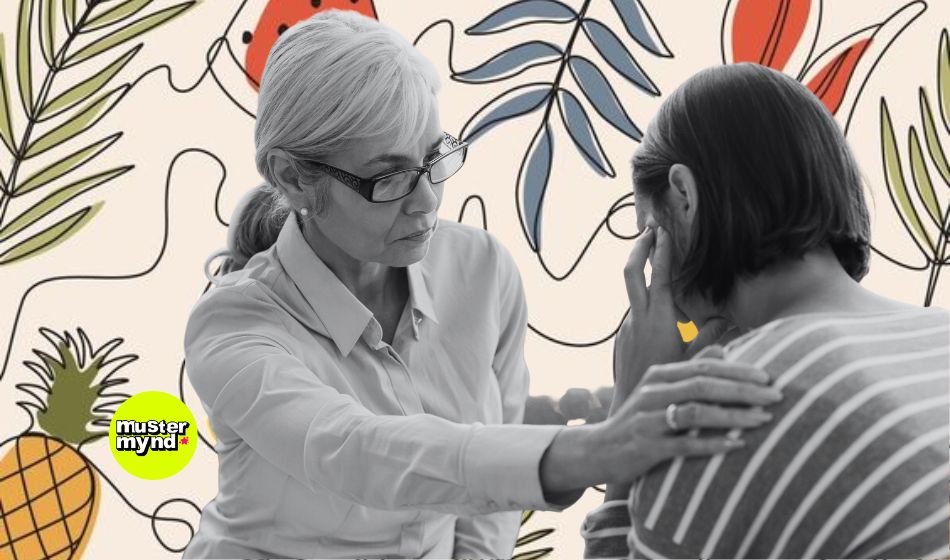A basic understanding of the types of therapists determines early recovery and prevention of irreparable mental health conditions. the wide range of therapeutic approaches and specialties available, it can be overwhelming to navigate the world of therapy. In this comprehensive guide, I have listed all the types of therapists and their unique roles. Knowing their specialties can help you make informed decisions when seeking therapeutic support.
Top 20 Types of Therapists & their Roles
Marriage & Family Counselor
Marriage and family counselors are trained to help couples and family members work out their problems. They help people, couples, and families talk to each other better, deal with family issues, and build good relationships.
Use Case: A couple who wants to talk about possible problems and build strong foundations for a happy marriage before they get married.
Divorce Therapist
Therapists who specialize in divorce help people, couples, and families who are going through a divorce or split. They help clients deal with emotional issues, figure out how to co-parent well, and start to rebuild their lives after a split.
Use Case: A couple going through a hard divorce, dealing with sadness, and looking for help to make sure they and their children can move on in a healthy way.
Addiction Therapist
Addiction therapists, who are also called substance abuse counselors, help people stop being dependent on booze or drugs. They offer individualized treatment plans, therapy, and support groups to get to the root reasons for addiction and help people get better.
Use Case: A person who is addicted to drugs and wants help to break the habit and learn good ways to deal with stress.
Behavioral Therapist
Behavioral therapists help people with difficult behaviors improve their relationships and find ways to deal with stress. They use techniques to change behavior, encourage good change, and improve social skills.
Use Case: A person who has trouble controlling his or her anger wants help finding triggers, dealing with feelings, and making relationships better.
Cognitive Therapist
Cognitive therapists try to change negative ways of thought to change how people act. They help people question and reframe negative thoughts, which can lead to healthier ways of thinking and better emotional health.
Use Case: A person with chronic anxiety goes to therapy to find and change their negative thought habits, which makes them feel less anxious.
Child Therapist
Child therapists, also called child psychologists, help kids and teens deal with mental and behavioral problems. They give kids a safe place to talk about their feelings, learn how to deal with problems, and talk about things like anxiety, sadness, or trauma.
Use Case: A child with low self-esteem and stress from school wants help to build self-confidence and deal with stress.
Clinical Therapist
Clinical therapists evaluate, identify, and treat a wide range of mental, emotional, and behavioral disorders. They work closely with people who have problems like depression, anxiety disorders, or bipolar disease. When needed, they provide therapy and work with psychiatrists.
Use Case: A person with serious depression needs a full evaluation, an accurate diagnosis, and a personalized treatment plan that includes therapy and medication management.
Social Work Therapist
Social work therapists assess, diagnose, treat, and try to avoid mental illnesses and emotional problems on a societal level. They work in neighborhoods, helping people through therapy and pushing for systemic changes to improve mental health care.
Use Case: A social worker is setting up outreach programs and coordinating support groups in a town where there are a lot of people with mental health problems and people who use drugs.
School/Education Therapist
School or Education Therapists, who are also called School Psychologists, are very important in schools. They work with students, teachers, and parents to improve academic results, help with learning problems, and help with mental and behavioral problems.
Use Case: A student who is having trouble learning and behaving needs to be evaluated, given help, and work with teachers and parents to create a good learning environment.
Trauma Therapist
Trauma therapists are trained to help people of all ages get over the effects of stressful events in their past. They offer one-on-one or group therapy using methods that have been shown to help people deal with trauma, reduce the symptoms of post-traumatic stress disorder (PTSD), and promote healing and resilience.
Use Case: A person who has been through a traumatic event, like a car accident or physical attack, and wants to go to therapy to deal with their PTSD symptoms and feel safe and well again.
Nutritional Therapist
Nutritional therapists work with their patients to figure out what their food needs are and come up with individualized plans to treat different health problems. When figuring out how to best use nutrition for physical and mental health, they take into account the person’s general health, well-being, and lifestyle.
Use Case: A person with an eating problem or mental health symptoms that are made worse by poor nutrition wants advice on how to eat better and improve their overall mental health.
Psychodynamic Therapist
Psychodynamic therapists look at how a person’s personality and behavior are shaped by unconscious processes and ongoing conflicts. Through deep exploration, they help their clients gain insight, become more self-aware, and understand how their past events affect their lives now.
Use Case: A person with recurring relationship problems and self-destructive habits goes to therapy to talk about their early attachment experiences and unresolved traumas. This helps them grow as a person and have better relationships.
Art Therapist
Art therapists use different kinds of art as a way to help people express themselves and learn about themselves. Through artistic activities like painting, drawing, and sculpting, they help people get in touch with their feelings, become more self-aware, and grow and heal.
Use Case: An art therapy session helps a person who is dealing with trauma or mental problems feel better and get better.
Music Therapist
Music therapists use the power of music to help people with their physical, mental, and social needs. They use making, listening to, and analyzing music to help people talk to each other better, feel better, and be healthier generally.
Use Case: A person with autism spectrum disease who goes to music therapy to improve their social skills, emotional expression, and integration of their senses.
Occupational Therapist
Occupational therapists focus on helping people get back or learn the skills they need to do everyday things. They help their clients improve their physical, mental, and emotional abilities so that they can do important work and live happy lives.
Use Case: A person recovering from a stroke goes to occupational therapy to regain small motor skills and relearn daily tasks like dressing, eating, and writing.
Rehabilitation Therapist
Rehabilitation therapists help people who have been hurt physically or have a disability. They give therapy to help restore functional skills, improve mobility, and make it easier for people to do things on their own.
Use Case: A person with a spinal cord injury is getting therapy to help them rebuild strength and mobility and get used to using aids.
Couples Therapist
Couples therapists are trained to help couples improve their relationships and deal with problems like broken communication, conflict resolution, sexual issues, and building trust. They give couples a safe place to work through problems and improve their relationship.
Use Case: A pair who is having trouble in their relationship goes to couples therapy to improve their communication, rebuild trust, and reconnect emotionally.
Sex Therapist
Therapists who deal with sexual health and relationships are called “sexual therapists.” They help people and couples figure out how to deal with problems like low libido, sexual dysfunction, communication problems, and worries about their relationships. This leads to a better and more satisfying sexual life.
Use Case: A person or couple with sexual problems or worries goes to sex treatment to deal with and fix them.
Geriatric Therapist
Of all the types of therapists listed here, Geriatric therapists are trained to help older people with their mental health. They talk about things that are unique to getting older, like memory loss, grief and loss, changes in life, carer stress, and staying emotionally healthy as you get older.
Use Case: An older person who has lost a spouse goes to therapy to deal with sadness, loneliness, and the challenges of getting older.
Solution-Focused Therapist
Solution-Focused Therapists focus on helping their clients find their skills, set goals, and come up with plans to reach those goals. They focus on answers instead of problems, which gives people the power to make good changes in their lives.
Use Case: A person who feels stuck and overwhelmed go to therapy to figure out their skills, set goals they can reach, and make a plan for positive change.
Conclusion: Types of Therapists & their Roles
With all the different kinds of therapists and their different specialties, it’s important to find the right one for your needs. There is a therapist who specializes in helping people with relationship problems, getting over addictions, healing from trauma, or growing as a person. Keep in mind that this list is not complete and that there are many other types of therapists. By learning about the different kinds and what they do, you can make an educated choice and start a therapeutic journey that will help you feel better and grow as a person. Don’t be afraid to talk to a licensed therapist who can help you get the help you need to improve your mental health.




